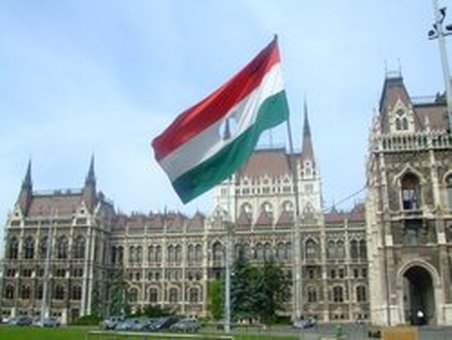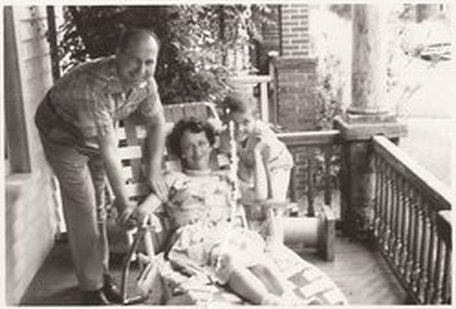 In last week's blog, Steve Bauer shared some of his Hungarian roots which would eventually lead his family to America. Steve's story continues with details of the family's political problems and escape from Hungary. Hungary 1956 By 1956 dad was a foreman at an Army Weapons Command Center. I remember as a five-year-old seeing the Russian soldiers marching two by two on our streets with rifles on their shoulders. From adult conversations, I knew they did not belong. Students and factory workers, an unusual partnership, united to overthrow the government in Budapest. (James A. Michener’s book, The Bridge at Andau, is a good book to read on this topic.) The Hungarian freedom fighters were winning the first week. The local Russian soldiers did not even want to fire upon the Hungarians. Many friendships were forged because the soldiers were there for years living in peace together. It was only after the Russians sent in their out of town tanks and soldiers that the freedom fighters were defeated. It is important to note that it was not about Russians against Hungarians but communism against some form of democracy or government by the people. Many Hungarians also became communists after WWII. Therefore, it was animosity between Hungarians (communist vs. non-communist) and animosity toward Moscow’s strong arm. Escape Many people started to escape Hungary in 1956 when the freedom fighters failed. My dad was asked to join the Communist Party at his factory. He said he wanted a couple of days to think about it. Within a week, we left for Austria. When we crossed the border, we did a lot of walking through farm fields, hiding behind hay lofts when convoys of Russian troops or Hungarian Avos were near. In the winter, we walked through wet, cold farm fields. The rheumatic fever, typhus and frost bite dad had experienced in the Siberian prison camp had damaged his heart, so travel was difficult. On a cold November day, we arrived at the Austrian border. We’d traveled by bus, train and on foot with the clothes on our backs, cash and some jewelry. We were in a group of about twenty When we got within 5 or 10 miles of the border, our group of twenty was helped by guides who knew the area to take us to the border. They were paid and then went back to get more of the many others who waited to leave. Traveling at night we were caught at the border. The German Shepherds started barking, the flood lights came on, and the border guards fired warning shots in the air. We were released, and I later found out that it was because our group gave the guards all their valuables. We had to escape because people who were “useful” to society were kept. Old or sick could leave because the government did not want to support them anyway—the beauty of communism. Not only were we stopped at the border but we were separated from my mom in the dark. We were picked up by a Volkswagen bus in Austria by individuals speaking German. We were taken to a Red Cross processing center and given warm clothes and food and water. My mom was actually in the same center but we did not know it. The next day we had a happy reunion when we found her. America at Last We left Hungary in November, 1956 and arrived in America in February, 1957. It seemed like we were on the ship for two weeks. It was very scary. For days and days, we saw nothing but water. Through many storms, it looked like we would be swallowed up by the waves. Children under eleven stayed with their mothers. The men were in the bottom of the boat. We got to see my dad every few days. When we ate in the cafeteria (if we had an appetite) the plates slid across the table as the ship rocked. Every day we came out for drills with our life jackets and instructions just in case we needed them. We stayed on a U.S. Army base for Christmas. My mom and dad were vetted through Interpol. We spent time at Camp Kilmer in New Jersey a few miles from New York City. I remember swallowing Juicy Fruit Gum, and I didn’t know it was gum. I remember 5-cent Coca-Cola. From there we went to Cleveland. As Ann mentioned in Part 1, my grandpa Bauer came to America to seek his fortune in the early 1900s. My aunt and uncle were born here so they were automatically U. S. citizens. When the farm started failing in Bakony-Csernye grandpa went back to Hungary, but Joe and Rose came back to America when they were teenagers and settled in Cleveland. We spoke Hungarian growing up, and my parents had to go to night school to learn English. I picked it up very quickly in school, and I still speak, write and read Hungarian. Since my mom died in 2009, I have no one to speak with, so I read Hungarian books aloud to hear myself and keep my pronunciations. My parents are my heroes. I know they could have lived out their lives in Hungary, but they wanted a better life for me. I often tell my kids and grandkids that if my parents hadn’t had the courage to act, I wouldn’t have my lovely wife Claudette and our many children and grandchildren. I became a citizen through my parents when I was fifteen, and I am very grateful to be an American!  Steve and his parents in their first new home.
1 Comment
|
Archives
August 2020
Categories
All
|
 RSS Feed
RSS Feed